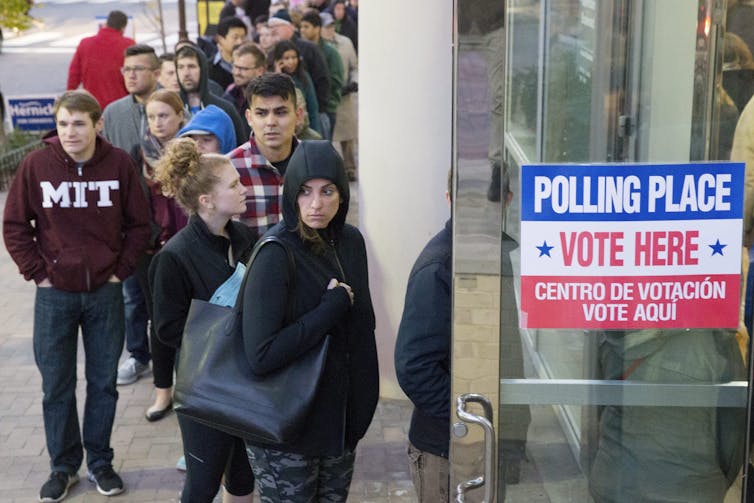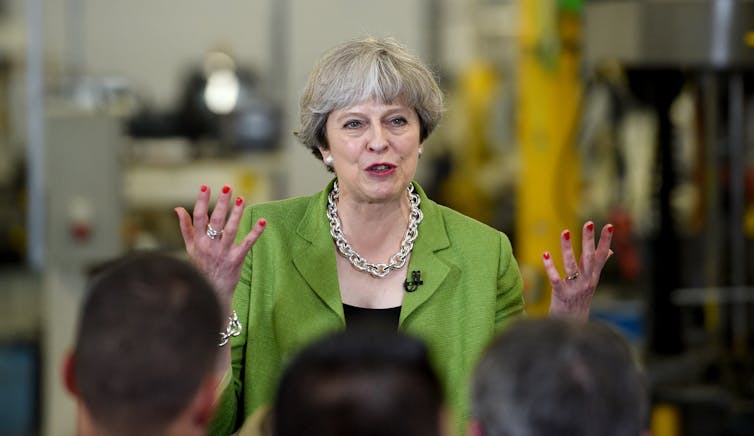Non-university educated white people are deserting left-leaning parties. How can they get them back?
- Written by Adrian Beaumont, Honorary Associate, School of Mathematics and Statistics, The University of Melbourne
In Australia, the US and the UK, whites without a university education have trended to the right in the past decade, relative to overall election results. Scott Morrison in Australia, Donald Trump in the US, and Boris Johnson and Brexit in the UK have recently won elections owing to these trends.
Read more: Final 2019 election results: education divide explains the Coalition's upset victory
I wrote about how Trump won the 2016 US election here. Although Trump lost the 2020 election, his defeat in the key Electoral College battleground states was very narrow (0.6% in the tipping-point state), and this was because his support with non-uni whites held up from 2016. See my 2020 US election report at The Poll Bludger.
In the UK, a YouGov poll, taken after the Conservative landslide at the December 2019 election from a sample of 42,000, gave the Conservatives bigger leads among low-income than high-income people. The Conservatives won by 58-25% among those with the lowest education level.
CNN analyst Harry Enten wrote in early April that in 2006, Democrats won 23 of the 50 federal US House seats with the highest population share of whites aged 25 or older without a university degree. In 2020, Democrats won just two of the top 50 such seats.
Democrats gained control of the House in 2006; they lost it in 2010, then regained it in 2018.
 In the 2016 US election, non-uni whites were an important part of the ‘base’ that elected Donald Trump president.
AAP/EPA/Michael Reynolds
In the 2016 US election, non-uni whites were an important part of the ‘base’ that elected Donald Trump president.
AAP/EPA/Michael Reynolds
In 2006, a Democrat won the seat with the second highest proportion of non-uni whites by 24 percentage points, winning his home county by 45 points. Trump won that county by 40 points in 2020.
Income is far less important than it was in 2006 in explaining how white people vote, with education level the dominant factor. Enten says that in 2020, non-uni whites below the median income level voted Republican by a 26-point margin, and those above voted Republican by 31 points. Democrats increased their margin by 39 points when shifting from non-uni whites to whites with a university degree.
In Australia, the regional Queensland federal seat of Capricornia was Labor-held for all but two terms from 1961 until 2013; those terms, in 1975 and 1996, were Coalition landslides. At the 2019 federal election, the LNP won Capricornia by a 62.4-37.6% margin, a massive 11.7% swing to the LNP from 2016, the highest of any seat.
From being pro-Labor relative to the national and Queensland results, Capricornia was 4% better for the Coalition in 2019 than Queensland overall (58.4-41.6% to LNP), and 10.9% better than the nation (51.5-48.5% to Coalition). According to the 2016 Census, just 11.3% of Capricornia’s population aged 16 and over had a Bachelor’s degree or higher, compared with 22% of Australia overall.
Australia 2016 and UK 2017 elections broke this trend
At the 2016 Australian federal election, the Coalition under Malcolm Turnbull’s leadership won only a bare majority of 76 of the 150 seats, losing 14 seats from the 2013 Coalition landslide.
The Coalition’s one gain from Labor occurred in the inner Melbourne seat of Chisholm (36% Bachelor’s degree or higher), while Labor gained the three northern Tasmanian seats of Bass (15% Bachelor’s), Braddon (9.5%) and Lyons (9.5%), Longman (9.3%) and Herbert (15.3%) in Queensland and seven seats including Lindsay (13.5%) in NSW.
Bass, Braddon, Lindsay, Longman and Herbert were all regained by the Coalition in 2019.
Although there was an overall swing to Labor of 3.1% at the 2016 election for a two party result of 50.4-49.6% to the Coalition, the Liberals gained a 2.2% swing in the inner Melbourne seat of Melbourne Ports (44.6%), reducing Labor’s margin to 51.4-48.6%. In 2019, the same seat (renamed Macnamara) was one of Labor’s best in swing terms with a 5% swing to them.
At the 2017 UK election, both major parties increased their vote share from 2015, with the Conservatives up 5.5% to 42.4% and Labour up 9.6% to 40%. In a major upset, the Conservatives lost their parliamentary majority, winning 317 of the 650 seats (down 13). They were able to form a government with support from Northern Ireland’s Democratic Unionist Party.
 In the 2017 UK election, the Conservatives under Theresa May, despite again forming government, lost their parliamentary majority. Johnson replaced May before the 2019 election.
AAP/EPA/Facundo Arrizabalaga
In the 2017 UK election, the Conservatives under Theresa May, despite again forming government, lost their parliamentary majority. Johnson replaced May before the 2019 election.
AAP/EPA/Facundo Arrizabalaga
In the 2017 YouGov post-election poll, Labour still lost the least-educated by 55-33%, but this 22-point margin was much better than the 33-point margin in 2019. Furthermore, Labour performed well in traditional heartland seats that voted heavily for Leave at the 2016 Brexit referendum.
In Hartlepool, which Labour had held continuously since its creation in 1974, Leave won by 69.6-30.4%, but Labour won 52.5% in 2017 (up 16.9% since 2015). The Conservatives won 34.2% (up 13.3%) and UKIP 11.5% (down 16.5%).
The 2021 UK Hartlepool byelection
Despite the Conservatives’ 2019 landslide, Labour held Hartlepool owing to vote splitting between the Conservatives and Brexit party. Labour won 37.7% (down 14.8% since 2017), the Conservatives 28.9% (down 5.3%), the Brexit party 25.8% and the Lib Dems 4.1% (up 2.3%). The UK uses first past the post.
A byelection was held on May 6. The Conservatives won 51.9% (up 23%), Labour 28.7% (down 9%) and an independent 9.7%. It was not shocking the Conservatives won as they were expected to consolidate the Brexit party vote.
What was shocking was Labour’s nine-point drop in support from what was already a bad loss nationally in 2019. I covered this byelection and the generally disappointing local government UK elections for Labour in a live blog for The Poll Bludger.
Non-uni whites are voting the opposite way to elite opinion
For this article, I am defining elite opinion as representing political journalists and opinion and editorial columns at organisations like The Conversation, The Guardian, the ABC, The Age and The Sydney Morning Herald.
In the US and UK, Trump, Brexit and Boris Johnson were hated by elite opinion, but non-uni whites voted heavily for all three.
When he deposed Tony Abbott as prime minister in September 2015, Turnbull was welcomed by elite opinion. I believe this welcome alienated non-uni whites, and led to Labor making many gains in seats with low levels of educational attainment at the 2016 election, while the Coalition gained in seats with high levels of educational attainment.
Elite opinion was never in favour of Morrison, and the 2016 pattern was reversed in 2019, with the Coalition making its strongest gains in regional Queensland. See this Poll Bludger post for the gory details of Labor’s collapse in regional Queensland.
Jeremy Corbyn was despised by UK elite opinion because he was pro-Brexit, and Labour was perceived as headed for a thrashing under Corbyn’s far-left policies. The 2017 surge for Labour nationally and in seats like Hartlepool probably reflected non-uni whites’ distrust of elite opinion.
By 2019, Corbyn had become associated with blocking Brexit, and so non-uni whites rejected him and Labour. Keir Starmer, who had been an ardent Remainer under Corbyn, then became Labour leader, and elite opinion welcomed him. However, the Hartlepool byelection result was utterly woeful for Starmer and Labour.
There are mitigating factors for Labour. The Conservatives have opened up a big poll lead as the result of the UK’s COVID vaccination program that has massively reduced deaths and cases from January peaks. However, the Conservative government is 11 years old, and Labour could only get into a near-tie late last year.
In the 2020 US presidential election, elite opinion was disdainful of Joe Biden owing to his age. It’s possible Trump would have gained further ground with non-uni whites and won the election in the Electoral College if not for this.
Left should attempt to dissociate from elite opinion
The above section implies that non-uni whites are voting contrarily to elite opinion. If left-wing parties want to regain the votes of non-uni whites, they should probably break with elite opinion on some issues.
I think political correctness is an area where the left could break with elite opinion without compromising its core values on supporting low-income people and the environment. As I wrote here, the right could gain with young voters from the political correctness issue.
Read more: Has a backlash against political correctness made sexual misbehaviour more acceptable?
At the very least, people from the left should be as condemnatory as those from the right about extreme politically correct jargon such as “chestfeeding”.
A danger for the right is being perceived as wanting to slash government services when in office. The 2014 Australian federal budget was very unpopular, with Labor’s lead blowing out by about three points to 55-45%. Trump was at his most unpopular during his first year in office, during which he attempted to gut Obamacare.
In the last year, there have been two massive victories for the left in New Zealand and Western Australia. The wins have been by such huge margins that Labo(u)r must have easily won non-uni whites.
Perhaps incumbent left-wing governments will be able to make progress with non-uni whites, but the difficulty is becoming an incumbent. Those two elections were strongly influenced by NZ and WA’s successful campaign against COVID.
Authors: Adrian Beaumont, Honorary Associate, School of Mathematics and Statistics, The University of Melbourne



















